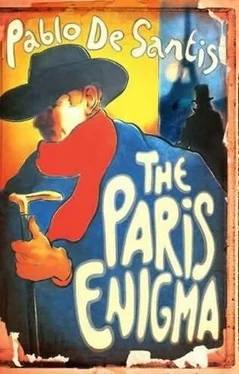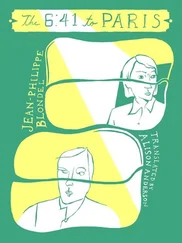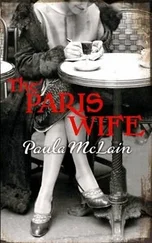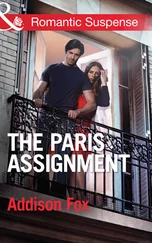“And what do you have to say about this series, Arzaky?” said a raspy voice. Madorakis, short and stout, had stepped forward. He was smoking a cigar and wore a tacky, threadbare jacket. He held tight to some sort of worn leather attaché case, tied with a cord (the catch was broken), from which yellowing papers, unbound books, and mended gloves struggled to escape. Surrounded by gentlemen, he looked like a traveling salesman. Arzaky was a good two heads taller than the Greek detective.
“And what series is that?”
“I’m talking about Louis Darbon, and your friend, Sorel, whom you sent to the guillotine.”
A murmur of surprise was heard. Several of those present weren’t aware of the identity of the cadaver incinerated in the Galerie des Machines.
“That’s not a serial crime. A series has to be based on a scene that the killer has imagined, inspired by a desire for revenge or by the criminal’s childhood. The murderer seeks to repeat that ideal image. There is none of that here.”
Madorakis laughed.
“That is pure Platonism, and I thought that you were in favor of exiling Plato from investigative work. There is no original, archetypal scene that the criminal seeks to replicate. He starts out committing crimes by chance, until he finds an element that strikes a chord with him, and then in the crimes that follow he tries to repeat that element. So if there is something that resembles the archetype, we’ll find it at the end of the series, not at the beginning.”
Arzaky moved toward him defiantly, using his height to his advantage. Madorakis didn’t back up.
“Don’t think you scare me with your so-called philosophy. That’s applying the third man defense. You think that the chain of similarities between one crime and another, and the vague model that inspires them, means that the true crime is nowhere to be found, the total crime that is the killer’s full expression and that therefore-”
“Therefore,” Madorakis interrupted, “all the pure murderers, and history shows us this, have kept killing until someone stopped them.”
“And what sort of link can there be between these two crimes without rhyme or reason?”
Madorakis adopted a mysterious air. “When the third one happens, you’ll know.”
“You sound like a fortune-teller. First you’re a philosopher and now the Delphic oracle. No one understands your message.”
“I’m sure that you do, Arzaky.”
Madorakis and Arzaky weren’t enemies, but they were looking at each other as if they were. What was it in the air that was canceling out past alliances? Was it the electricity of the World’s Fair, the thousands of lamps prepared to make life go on even after nightfall? Arzaky himself seemed shocked by Madorakis’s aggressiveness. Going up against Caleb Lawson or Castelvetia didn’t bother him, or having a shouting match with his friend Magrelli, but the Greek’s outburst had disconcerted him.
I took my watch out of my pocket and checked the time: the argument continued, but I had to leave. I made my way through the acolytes, who didn’t even look at me, because their attention was on the detectives’ increasingly heated discussions. Only the Sioux nodded his head in acknowledgment. I went past Neska, who pretended not to see me.
Although no one could have any interest in following me, I walked through the night looking back every couple of steps, like a conspirator. It was late: that time of the night when we no longer check our watches, and the only people we pass on the street are entirely joyful or entirely melancholy. I was so distracted I almost got hit by a carriage. I heard an insult, but by some strange auditory hallucination it seemed like it was the horse and not the coachman who shouted at me. It was such a deep voice and a sensible tone: one couldn’t help but agree. We should take a cue from horses, they never shut their eyes.
When I arrived at the theater, the last audience members were leaving. In opera, or any kind of theater performance, light or profound, you see the same phenomenon: the first audience members leave the theater chatting and laughing, eager to abandon the world of fiction and reenter the real, where they feel at home. The last ones to leave, on the other hand, have to be forced out by the ushers or the lights going up or the silence that follows the applause. If it were up to them, they would remain there in the imaginary world the performance offers them. These last stragglers came out without saying a word, grieving over having to abandon the Mermaid’s island. They didn’t know their place in the world outside; in real life the seats aren’t numbered.
I found the side door mentioned in the note and entered without knocking. Dusty sets, papier-mâché statues, armor, and costumes from other shows. I was reminded of the Victoria Theater, where the murderous magician had performed. I thought that in some way all theaters are the same, as if their architects filled them with nooks to show that to create just one stage of illusion you need hundreds of wooden artifacts, moth-eaten curtains, and costumes covered in cobwebs.
I followed the sound of a woman’s singing down a hallway. Her voice was so sweet that I longed to stop right there, not wanting to break the spell. I had been to the opera a couple of times and once to a concert, and all three times I fell asleep. I prefer unexpected music, the music one hears without seeking it out, that is unaware that I’m listening.
My footsteps made the woman’s voice grow quieter; by the time I was in front of her door and read her name, The Mermaid, she had already stopped singing. She received me with a nervous smile and peeked out into the dark hallway to see if anyone had followed me. She was dressed in a green mermaid costume; some sort of oil made her hair shine as if it were wet.
“Did you bring the photograph?”
I had expected a greeting, some friendly conversation, not just an urgent demand. Once I handed over the photograph, I had no power. I held it out to her but I didn’t let go of it immediately and she had to tug at it a bit. I was ashamed by my hand’s attitude, acting on its own, without even consulting me. The Mermaid looked at the photo to make sure it was the one she was looking for, turned it around and read her own handwriting: “I dreamed in the Grotto where the Mermaid swims.”
She stared and stared at the green writing.
“Does Arzaky know about this postcard?”
“No,” I lied.
“You are a gentleman, and you did the right thing by returning it.
I am eternally grateful.”
“I’m not a gentleman. A gentleman wouldn’t have stolen it.”
“Why did you? Did you think it would help you solve the crime?”
“No. I don’t know why. I’ve never stolen anything else in my life.”
“Now that I don’t believe. There’s never a first time, we’ve always sinned, hinting at what’s to come.”
The Mermaid had barely spoken those words when I remembered another slight infraction: two months before my trip, I had gone into the Craig family kitchen and found a pile of Señora Craig’s clothes on top of the wooden table, fresh off the line and still warm from the sun. I hadn’t stolen anything, but I had stroked the garments for a few seconds before I heard the footsteps of the cook approaching. If someone had caught me, what would I have been able to say to them? What worried me about these behaviors was not that they were my most shameful, my most illicit, but rather that they seemed more truthful than all my polite words and kind gestures.
“Are you going to tell Arzaky about our conversation?” The Mermaid’s voice pulled me from my thoughts.
“No,” I answered.
“It’s better that way. Remember, I work for Arzaky too, but I can’t tell him everything. Arzaky wouldn’t know what to do with all the things I find. He sends me to the grottos and caves so I can bring him the clues that are submerged, the worn-out pieces of sunken ships.”
Читать дальше












